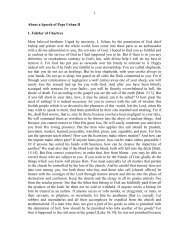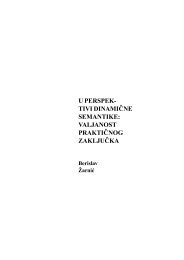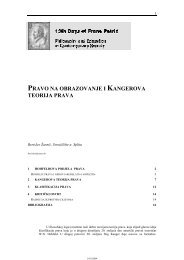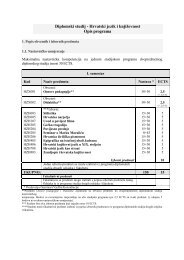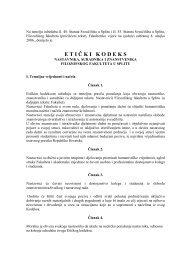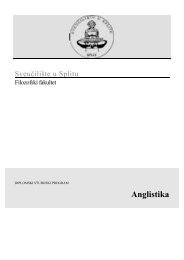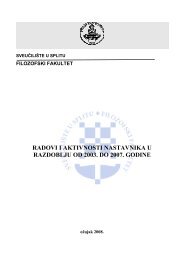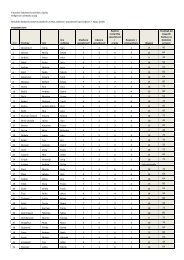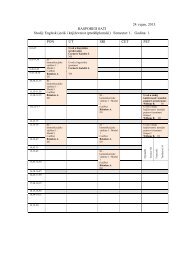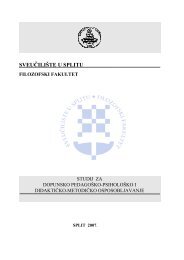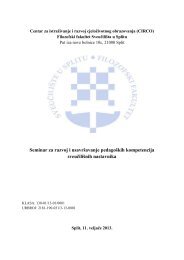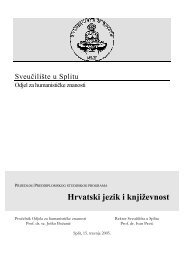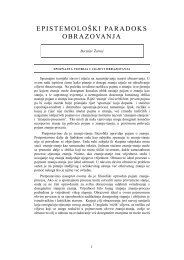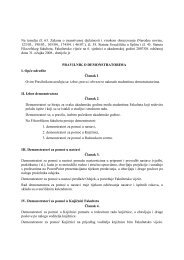English Studies
English Studies
English Studies
You also want an ePaper? Increase the reach of your titles
YUMPU automatically turns print PDFs into web optimized ePapers that Google loves.
G R A D U A T E D E G R E E P R O G R A M M E : E N G L I S H S T U D I E S<br />
Name of lecturer<br />
Learning<br />
outcomes and<br />
competences<br />
Prerequisites<br />
Course contents<br />
Recommended<br />
reading<br />
Prof. Dr Šime Pilić<br />
The course provides information necessary to understand the position and<br />
role of teacher in modern society, as well as acquiring competences and<br />
general skills required for a career in education, such as: practical<br />
conveying of knowledge, problem solving, team work, professional ethics,<br />
research skills, capacity of adjustment to new situations, creativity,<br />
independence in work, efficiency in dealing with projects, as well as<br />
specific skills, e.g. observing and identifying correlations between social<br />
and educational processes, adaptation to new principles, recognising<br />
differences in pupils and systems of learning and their different roles within<br />
the education system, commitment to pupils' progress and success, respect<br />
for pupils and fellow teachers, capacity of critically evaluating one's own<br />
work, etc.<br />
Competences and skills acquired upon successful completion of the course<br />
Sociology of Education.<br />
Genesis and evolution of the teaching profession.<br />
Socio-professional group consisting of primary, secondary, and university<br />
level teachers.<br />
Teacher education and training and study programme reforms.<br />
Teaching profession in Croatia and other societies: education, employment,<br />
and chances of progress and promotion.<br />
Teaching profession in comparison with other professions and occupations<br />
in Croatian society.<br />
Social status and role of the teacher. Social relations in the teaching process.<br />
Social status and rating of the teaching staff. Professional and trade union<br />
associations. Conflicts. Teachers of all levels of education as integral part of<br />
social intellectual elite.<br />
Teacher mobility. The teaching profession in the context of European<br />
integrations.<br />
Cindrić, M. (1995). Profesija učitelj u svijetu i u Hrvatskoj. Zagreb: Persona<br />
Marinković, R., Karajić, N. (Eds.). (2004). Budućnost i uloga<br />
nastavnika/Future and the role of teachers. Zagreb: PMF/Faculty of<br />
science.<br />
Pilić, Š., Botica, A. (2003). Ugled dvadeset zanimanja u očima učitelja. U<br />
Ivon, H. (Ed.). Prema kvalitetnoj školi. (79-88). Split: HPKZ.<br />
Pilić, Š. (2002). The Education of Teachers in a Post-Socialist Society: the<br />
Case of Croatia. In Sultana, R. G. (Ed.). Teacher Education in the Euro-<br />
Mediterranean Region. (51-68). New York, Washington, Baltimore,<br />
Bern, Frankfurt an Main, Berlin, Brussels, Vienna, Oxford: Peter Lang<br />
Publishing.<br />
Pilić, Š. (2000). Regrutiranje srednjoškolskih profesora u postsocijalističkoj<br />
Hrvatskoj. Život i škola, 46, 3, 51-64.<br />
Pilić, Š. (1999). Tko su prijatelji nastavnika. Školski vjesnik, 48, 1, 3-21.<br />
Pilić, Š. (1998). Vrednovanje odnosa nastavnik – učenik sa stajališta<br />
72



